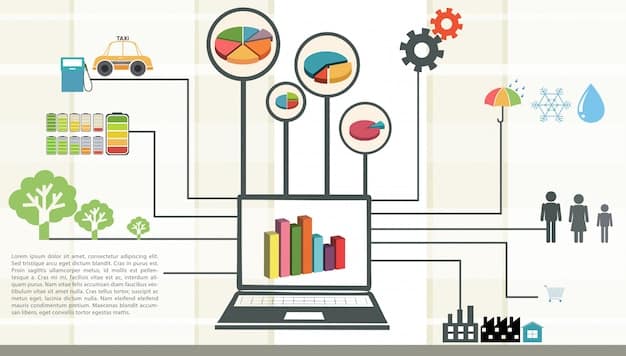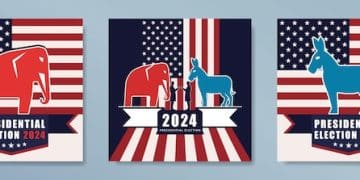Universal Basic Income: Arguments For and Against in Public Policy

Universal Basic Income (UBI) sparks intense debate, with proponents arguing it reduces poverty and boosts economies, while opponents worry about costs and workforce disincentives in current public policy discussions.
Exploring the key arguments for and against Universal Basic Income in current public policy debates is essential to understanding its potential impact on society and the economy. This article dives deep into the pros and cons, helping you form an informed opinion.
Understanding Universal Basic Income (UBI)
Universal Basic Income (UBI) has become a hot topic in public policy discussions. But what exactly is it? Simply put, UBI is a system where every citizen receives a regular, unconditional cash payment from the government, regardless of their income, employment status, or background.
What is the Core Idea of UBI?
The central premise behind UBI is to provide a safety net, ensuring everyone has enough money to cover basic needs. This differs from traditional welfare programs, which often have strict eligibility requirements and are tied to specific needs like unemployment.
How UBI is Different from Other Welfare Programs?
Unlike welfare programs, UBI is universal and unconditional. This means everyone gets it, no matter what. Advocates argue this reduces bureaucracy, eliminates the stigma associated with receiving aid, and provides greater financial stability.

Let’s dive into some of the main reasons why UBI is debated so fiercely.
- Simplicity: UBI can be simpler to administer than complex welfare programs.
- Universality: It reaches everyone, even those who might not qualify for traditional aid.
- Empowerment: It gives people more autonomy in managing their finances.
UBI is a radical idea with the potential to reshape society. However, it also raises some serious questions that need answering.
Arguments in Favor of UBI
The arguments in favor of Universal Basic Income (UBI) often center on its potential to address poverty, reduce inequality, and boost economic growth. Proponents believe UBI is a tool that can empower individuals and reshape society for the better.
Poverty Reduction and Economic Security
One of the most compelling arguments for UBI is its potential to reduce poverty. By providing a basic income to everyone, UBI ensures a minimum standard of living, cushioning individuals from economic hardship.
Boosting Entrepreneurship and Innovation
With a financial safety net in place, individuals might be more willing to take risks, start businesses, and pursue innovative projects. UBI could foster a more dynamic and entrepreneurial economy.
- Reduced Stress: Knowing basic needs are covered can reduce stress and anxiety.
- More Time: People can invest time in education, training, or starting a business.
- Economic Stimulus: The money injected into the economy can boost demand and create jobs.
Supporters argue that UBI is not just a social safety net but also an investment in human potential. It frees people to pursue their passions, contribute to their communities, and drive economic growth.
Arguments Against UBI
While UBI has strong proponents, it also faces significant criticism. Concerns about cost, workforce disincentives, and potential inflation top the list of arguments against implementing a Universal Basic Income.
Cost and Funding Challenges
One of the most significant concerns is the cost of implementing UBI. Providing a basic income to every citizen requires a huge amount of money, raising questions about how it would be funded.
Disincentives to Work and Productivity
Critics worry that UBI could discourage people from working, leading to a decline in workforce participation and overall productivity. If everyone receives a basic income, some may choose not to seek employment.

- Reduced Workforce: Fewer people working could strain the economy.
- Possible Inflation: Increased demand without increased supply could lead to inflation.
- Alternative Solutions: Some argue that targeted programs are more efficient.
Detractors argue that UBI is unsustainable and could have unintended negative consequences. They suggest that targeted programs, like job training and earned income tax credits, may be more effective at addressing poverty.
Potential Economic Impacts of UBI
UBI’s effects on the economy are hotly debated. Supporters say it could stimulate growth, while critics worry about inflation and workforce participation. Understanding these potential impacts is crucial.
Impact on Employment and the Labor Market
A key question is how UBI would affect employment. Some studies suggest a slight decrease in the labor force, but others argue that it could free people to pursue more fulfilling work.
Influence on Consumption and Demand
UBI could significantly boost consumer spending by putting more money in people’s pockets. This increase in demand could stimulate economic growth, but it could also lead to inflation.
The economy could see:
- Increased Demand: Higher consumption could boost business revenues.
- Job Creation: New businesses might emerge to meet rising demand.
- Potential Inflation: Prices could rise if supply doesn’t keep up with demand.
The economic impacts of UBI are complex and depend on many factors, including the level of the basic income, how it is funded, and the overall state of the economy.
Social and Ethical Considerations
Beyond the economic aspects, Universal Basic Income raises important social and ethical questions. How would UBI affect people’s sense of purpose, their relationships, and their contribution to society?
Impact on Social Cohesion and Community
Some argue that UBI could strengthen communities by reducing economic inequality and fostering a greater sense of shared well-being. Others fear it could lead to social isolation and a decline in civic engagement.
Effect on Human Dignity and Purpose
UBI could provide individuals with more autonomy and control over their lives, enhancing their sense of dignity and purpose. However, some worry it could undermine the value of work and create a sense of dependency.
- Increased Autonomy: People have more control over their lives.
- Reduced Stigma: It eliminates the stigma associated with welfare.
- Ethical Concerns: Questions arise about fairness and responsibility.
The ethical considerations surrounding UBI are complex and reflect different views on human nature, social responsibility, and the role of government.
The Future of UBI in Public Policy
The debate over Universal Basic Income is likely to continue as policymakers grapple with issues like automation, income inequality, and the changing nature of work. What does the future hold for UBI?
Potential Pathways for Implementation
There are many ways UBI could be implemented, from small-scale pilot programs to comprehensive national initiatives. The specific approach will depend on political priorities, economic conditions, and social values.
Role in Addressing Economic Inequality
As economic inequality continues to rise, UBI may be seen as a potential solution to ensure a more equitable distribution of wealth and opportunity. However, it is just one tool among many.
We are likely to see:
- Ongoing Debates: The discussion about UBI will continue.
- Pilot Programs: More experiments will test its effects.
- Evolving Policies: UBI could become part of the broader welfare state.
The future of UBI is uncertain, but it is clear that this concept has the potential to reshape society and address some of the most pressing challenges of our time.
| Key Point | Brief Description |
|---|---|
| 💰 Poverty Reduction | UBI ensures a minimum standard of living for everyone. |
| 💼 Work Disincentives | Critics worry UBI may discourage people from working. |
| 🚀 Economic Stimulus | UBI could boost consumer spending and stimulate growth. |
| 📈 Inflation Risks | Increased demand without increased supply could lead to inflation. |
Frequently Asked Questions (FAQ)
▼
The primary goal of UBI is to provide a basic level of economic security to all citizens, ensuring they can cover essential needs regardless of their employment status or income level.
▼
UBI is universal and unconditional, meaning everyone receives it without any specific requirements, while traditional welfare programs often have eligibility criteria and are need-based.
▼
Potential benefits include poverty reduction, increased consumer spending, and a stimulus to economic growth as people have more money to invest and spend in the economy.
▼
Concerns include the high cost of implementation, potential disincentives to work, and the risk of inflation if the supply of goods and services doesn’t keep up with increased demand.
▼
UBI could encourage entrepreneurship by providing a safety net that allows people to take more risks and pursue new business ventures, fostering innovation and economic dynamism.
Conclusion
The debate over Universal Basic Income highlights the complex trade-offs involved in designing public policy. While UBI offers the promise of poverty reduction and economic security, concerns about cost and workforce disincentives must be carefully considered. As technology continues to reshape the labor market, the discussion around UBI is sure to evolve, potentially leading to innovative approaches to social welfare and economic empowerment.





